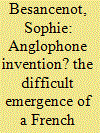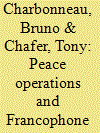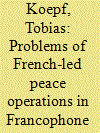| Srl | Item |
| 1 |
ID:
114755


|
|
|
|
|
| Publication |
2012.
|
| Summary/Abstract |
The concept of security sector reform (SSR) was first formulated by UK development actors. Since 2008, France has officially adopted an SSR strategy and promoted the concept at the European level during the country's 2008 EU Presidency. However, what appears on paper to resemble full support from French institutions is in fact more complex. If the anglophone roots of the policy initiative do not seemingly explain its lack of institutionalization in the French context, it would appear that the difficulty faced by the French administration in finding a whole-of-government agreement on what the content of SSR should be, does.
|
|
|
|
|
|
|
|
|
|
|
|
|
|
|
|
| 2 |
ID:
114753


|
|
|
|
|
| Publication |
2012.
|
| Summary/Abstract |
Using a probabilistic method to shed light on the effective use of the French language in the so-called Francophone states, the article argues that Organisation internationale de la Francophonie (OIF) membership is not a reliable marker of French-language proficiency for countries contributing to peace operations. It further dismisses the assumption that sending peacekeeping personnel from Francophone countries automatically improves the efficiency of peace missions deployed in Francophone areas. The Belgian participation in the UN peace operation in Lebanon is used as a case study to test the empirical validity of the former arguments.
|
|
|
|
|
|
|
|
|
|
|
|
|
|
|
|
| 3 |
ID:
114750


|
|
|
|
|
| Publication |
2012.
|
| Summary/Abstract |
This introductory article presents the history of francophone spaces to critically assess their specificity, and to situate them in academic debates on peace operations. It argues that the specificity is the inescapable a priori context of peace missions, even if this context is rapidly evolving and in interaction with non-francophone spaces. The specificity is nevertheless increasingly difficult to identify, as new practices and conditions emerge and as the lines between different francophone spaces and between francophone and non-francophone spaces are increasingly fluid. The article explores the range of possibilities that emerge from such interrogations, and emphasizes that to add the experiences of 'francophone spaces' to analyses of peace operations is to confront the dynamics of inclusion and exclusion already expressed by the terms 'francophone' and francophonie. This approach points to where and how hegemonic practices move and change between locations and different contexts, and where and how the organization or reorganization of power is negotiated, imposed and/or resisted across 'francophone' and 'non-francophone' spaces.
|
|
|
|
|
|
|
|
|
|
|
|
|
|
|
|
| 4 |
ID:
114754


|
|
|
|
|
| Publication |
2012.
|
| Summary/Abstract |
By examining peace operations in Côte d'Ivoire, Chad and the Central African Republic (CAR), and the Democratic Republic of Congo (DRC), this article shows that French-led peace operations in francophone Sub-Saharan Africa are highly problematic. This is especially true for those countries towards which France simultaneously pursues a bilateral military policy. The maintenance of the policy makes the political neutrality of the operations difficult and undermines international peacekeeping efforts. Furthermore, it gives African actors the opportunity to instrumentalize the policies and use them against each other. Therefore, only a full multilateralization of French military engagement, as well as a stronger commitment by other external actors, can make peace operations in the region more credible and more effective.
|
|
|
|
|
|
|
|
|
|
|
|
|
|
|
|
| 5 |
ID:
114756


|
|
|
|
|
| Publication |
2012.
|
| Summary/Abstract |
The official French justifications for the 2011 intervention in Côte d'Ivoire fall into three categories: existence of a Security Council mandate; protection of French nationals and others; and France's respect for democracy. The respect for democracy justification was dropped when ex-president Gbagbo was arrested. The French role in the arrest itself was categorically denied by French officials, while Operation Licorne's strict respect for Security Council mandates and the imminent need for protection of various categories of persons were underlined. Democracy and human rights remerged in the President Sarkozy's concluding policy-oriented speech in order to justify France's honourable role in reinforcing these principles in Africa.
|
|
|
|
|
|
|
|
|
|
|
|
|
|
|
|
| 6 |
ID:
114752


|
|
|
|
|
| Publication |
2012.
|
| Summary/Abstract |
Task-sharing in peace operations raises questions about the relationships between intergovernmental institutions. Since it adopted a new institutional architecture in 1997, the Organisation internationale de la Francophonie (OIF) has been involved in such relationships. Due to new prerogatives in conflict management, this actor has emerged as an institutional 'third party' that supports the efforts of peace operations rather than filling the classic task-sharing role of subcontractor. This article focuses on two sides of the OIF in terms of inter-organizational cooperation: a secondary role in the diplomatic sphere, and a major role in the capacity-building of peace operations (from peacekeeping to peacebuilding).
|
|
|
|
|
|
|
|
|
|
|
|
|
|
|
|
| 7 |
ID:
114757


|
|
|
|
|
| Publication |
2012.
|
| Summary/Abstract |
From a post-colonial perspective, this article argues that the Mission des Nations Unies pour la stabilisation en Haiti (MINUSTAH) helps in our understanding of how the conventional peace operation model is, at the field-level, constantly challenged and renegotiated. Formally conceived as a francophone mission operating in a francophone country, MINUSTAH's deployment and interactions on the ground proved to be complex. Composed of a majority of Latin American troops, MINUSTAH has been exposed to symbolic and material pressures that range from the UN 'liberal peace model', French colonial heritage and previous US interference, to post-colonial worldviews and local demands. Benefitting from the combination of an academic approach and a practitioner's perspective this article demonstrates that although MINUSTAH was framed inside a specific UN mission pattern, grounded in a supposedly dominant francophone culture and located on the 'outskirts' of the United States, it has been subjected to a plurality of other pressures - such as demands from leading contributing countries - and opened to multiple re-articulations of its original mandate. This article politicizes the multiple encounters between a pre-defined peace operation model and everyday field realities.
|
|
|
|
|
|
|
|
|
|
|
|
|
|
|
|
| 8 |
ID:
114751


|
|
|
|
|
| Publication |
2012.
|
| Summary/Abstract |
Drawing upon the authors' experience and work with the Francophone Research Network on Peace Operations in Montreal, developing and implementing peacekeeping capacity-building projects for French-speaking countries in bilateral and multilateral contexts, this article critically explores the intersection of peace operations and the francophone spaces. The argument is that there has been an increasing 'francophone fact' or a 'francophonization' of peace operations. The article explains this emergence and examines its implications that, we argue, extend beyond the francophone space. The article suggests that the increasing importance of the 'francophone fact' in peacekeeping is the result of three reinforcing dynamics: (1) the reality of UN deployments in the past decade with more than a half of the blue helmets deployed in francophone settings; (2) the consequent creation of specific needs for the 'good functioning' of multidimensional peace operations; and (3) an incomplete but undeniable 'appropriation' of peace operations by francophone states and organizations.
|
|
|
|
|
|
|
|
|
|
|
|
|
|
|
|